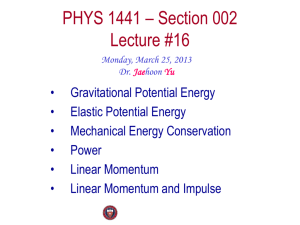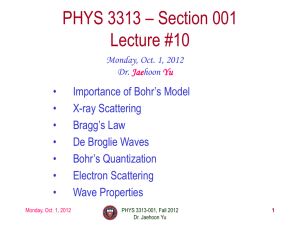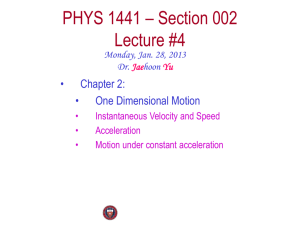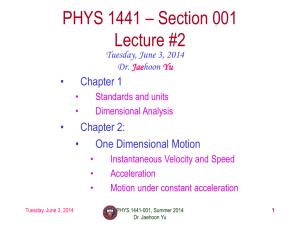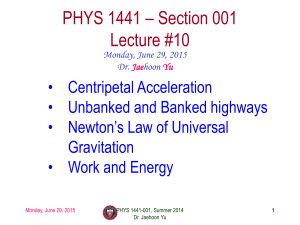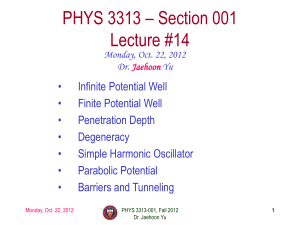phys3313-spring14-011314
advertisement
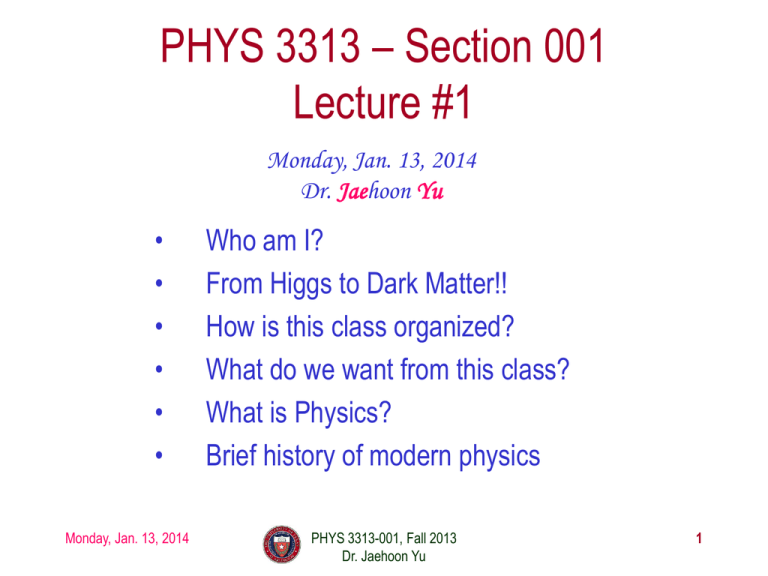
PHYS 3313 – Section 001 Lecture #1 Monday, Jan. 13, 2014 Dr. Jaehoon Yu • • • • • • Monday, Jan. 13, 2014 Who am I? From Higgs to Dark Matter!! How is this class organized? What do we want from this class? What is Physics? Brief history of modern physics PHYS 3313-001, Fall 2013 Dr. Jaehoon Yu 1 Announcements • Plea to you: Please turn off your cell-phones, pagers and computers in the class • Reading assignment #1: Read and follow through appendices 3, 5, 6 and 7 by Tuesday, Jan. 21 – There will be a quiz next Wednesday, Jan. 22, on these reading assignments • No class Monday, Martin Luther King Day Monday, Jan. 13, 2014 PHYS 3313-001, Fall 2013 Dr. Jaehoon Yu 2 Who am I? • • • • Name: Dr. Jaehoon Yu (You can call me Dr. Yu) Office: Rm 342, Chemistry and Physics Building Extension: x22814, E-mail: jaehoonyu@uta.edu My profession: High Energy Particle Physics (HEP) – Collide particles (protons on anti-protons or electrons on anti-electrons, positrons) at the energies equivalent to 10,000 Trillion degrees – To understand • Fundamental constituents of matter • Forces between the constituents (gravitational, electro-magnetic, weak and strong forces) • Origin of Mass • Creation of Universe (Big Bang Theory) – A pure scientific research activity • Direct use of the fundamental laws we find may take longer than we want but • Indirect product of research contribute to every day lives; eg. WWW – Why do we do with this? • Make our everyday lives better Monday, Jan. 13, 2014 PHYS 3313-001, Fall 2013 Dr. Jaehoon Yu 3 HEP and the Standard Model HEP: A field of physics that studies the fundamental constituents of matter and basic principles of interactions between them. Make up most ordinary matters ~0.1mp Discovered in 1995, ~175mp • Total of 16 particles (12+4 force mediators) make up all the visible matter in the universe! Simple and elegant!!! Jan. 13, 2014 Fall 2013 4 • Monday, Tested to a precision of 1PHYS partDr.3313-001, per million! Jaehoon Yu Monday, Jan. 13, 2014 PHYS 3313-001, Fall 2013 Dr. Jaehoon Yu 5 Accelerators are Powerful Microscopes. They make high energy particle beams that allow us to see small things. seen by low energy beam (poorer resolution) Monday, Jan. 13, 2014 seen by high energy beam (better resolution) PHYS 3313-001, Fall 2013 Dr. Jaehoon Yu 6 Accelerators are also Time Machines. They make particles last seen in the earliest moments of the universe. anti-particle beam particle beam Energy energy energy Particle and anti-particle annihilate. E= Monday, Jan. 13, 2014 2 mc PHYS 3313-001, Fall 2013 Dr. Jaehoon Yu 7 Structure of Matter Matter Molecule Atom Nucleus Baryon Quark (Hadron) u 10-14m 10-9m 10-10m 10-2m Condensed matter/Nano-Science/Chemistry Atomic Physics Nuclear Physics 10-15m protons, neutrons, mesons, etc. p,W,L... <10-19m top, bottom, charm, strange, up, down Electron (Lepton) <10-18m High Energy Physics Monday, Jan. 13, 2014 PHYS 3313-001, Fall 2013 Dr. Jaehoon Yu 8 • Fermilab Tevatron and LHC at CERN World’s Highest Energy proton-anti-proton collider • – 4km circumference – Ecm=1.96 TeV (=6.3x10-7J/p 13M Joules on the area smaller than 10-4m2) – Equivalent to the kinetic energy of a 20t truck at the speed 81mi/hr 130km/hr • – 27km circumference, 100m underground – Design Ecm=14 TeV (=44x10-7J/p 362M Joules on the area smaller than 10-4m2) Equivalent to the kinetic energy of a B727 (80tons) at the speed 193mi/hr 312km/hr ~100,000 times the energy density at the ground 0 of the Hiroshima atom bomb – Tevatron was shut down on Sept. 30, 2011 – Vibrant other programs running, including the • search for dark matter!! • • Chicago CDF p Tevatron Monday, Jan. 13, 2014 World’s Highest Energy p-p collider ~3M times the energy density at the ground 0 of the Hiroshima atom bomb First 7TeV collisions 2010 The highest energy humans ever achieved!! Large amount of data accumulated in 2011 – 2013 Shutdown in Feb. 2013 for 18mo for upgrade DØ p PHYS 3313-001, Fall 2013 Dr. Jaehoon Yu 9 The ATLAS and CMS Detectors • • • • • Fully multi-purpose detectors with emphasis on lepton ID & precision E & P Weighs 7000 tons and 10 story tall Records 200 – 400 collisions/second Records approximately 350 MB/second Record ~2 PB per year 200*Printed material of the US Lib. of Congress Monday, Jan. 13, 2014 PHYS 3313-001, Fall 2013 Dr. Jaehoon Yu 10 What is the Higgs and What does it do? • When there is perfect symmetry, one cannot tell directions! Monday, Jan. 13, 2014 PHYS 3313-001, Fall 2013 Dr. Jaehoon Yu 11 What? What’s the symmetry? • Where is the head of the table? • Without a broken symmetry, one cannot tell directional information!! Monday, Jan. 13, 2014 PHYS 3313-001, Fall 2013 Dr. Jaehoon Yu 12 What is the Higgs and What does it do? • When there is perfect symmetry, one cannot tell directions! • Only when symmetry is broken, can one tell directions • Higgs field works to break the perfect symmetry and gives mass to all fundamental particles • Sometimes, this field spontaneously generates a particle, the Higgs particle • So the Higgs particle is the evidence of the existence of the Higgs field! Monday, Jan. 13, 2014 PHYS 3313-001, Fall 2013 Dr. Jaehoon Yu 13 So how does Higgs Field work again? • Person in space no symmetry breaking • Person in air symmetry can be broken • Sometimes, you get Just like a tornado is a piece of evidence of the existence of air, Higgs particle is a piece of evidence of Higgs mechanism Monday, Jan. 13, 2014 PHYS 3313-001, Fall 2013 Dr. Jaehoon Yu 14 Higgs Production X-sec and BR 130GeV Higgs mass is not given in the theory!! Monday, Jan. 13, 2014 PHYS 3313-001, Fall 2013 Dr. Jaehoon Yu 15 Information & Communication Source • Course web page: http://www-hep.uta.edu/%7Eyu/teaching/spring14-3313001/spring14-3313-001.html – – – – – – – Contact information & Class Schedule Syllabus Homework Holidays and Exam days Evaluation Policy Class Style & Communication Other information • Primary communication tool is e-mail: Make sure that your email at the time of course registration is the one you most frequently read!! • Office Hours: 2:30 – 3:40pm, Mondays and Wednesdays or by appointments Monday, Jan. 13, 2014 PHYS 3313-001, Fall 2013 Dr. Jaehoon Yu 16 Textbook • Title: Modern Physics for Scientists and Engineers – 4th edition • Authors: S.T. Thornton and A. Rex • ISBN: 978-1-133-10372-1 Monday, Jan. 13, 2014 PHYS 3313-001, Fall 2013 Dr. Jaehoon Yu 17 Evaluation Policy • Homework: 30% • Exams – Mid-term Exam (Wed., Mar. 5): 20% – Final Comprehensive Exam (11 – 1:30pm, Mon, May. 5): 25% – Missing an exam is not permissible unless pre-approved • No makeup test • You will get an F if you miss any of the exams without a prior approval • Group Research Project: 15% • Pop-quizzes: 10% 100% • Extra credits: 10% of the total • Grading will be done on a sliding scale 13, 2014 Fall 2013 • Monday, 55%Jan.of the grade isPHYS inDr.3313-001, your hand!! Jaehoon Yu 18 Homework • Solving homework problems is the only way to comprehend class material • Consists of a lot of reading, deriving and writing • Each homework carries the same weight • ALL homework grades will be used for the final grade • Home work will constitute 30% of the total – A good way of keeping your grades high • Strongly encouraged to collaborate – Just make sure to submit your own answers written in your OWN way!! Monday, Jan. 13, 2014 PHYS 3313-001, Fall 2013 Dr. Jaehoon Yu 19 Attendances and Class Style • Attendances: – Will be taken randomly – Will be used for extra credits • Class style: – Lectures will be on electronic media • The lecture notes will be posted on the web AFTER each class – Will be mixed with traditional methods – Active participation through questions and discussions are STRONGLY encouraged Extra credit…. – Communication between you and me is extremely important • If you have problems, please do not hesitate talking to me Monday, Jan. 13, 2014 PHYS 3313-001, Fall 2013 Dr. Jaehoon Yu 20 Extra credit • Up to 10% addition to the total – Could boost a B to A, C to B or D to C • What constitute for extra credit? – Random attendances – Physics Colloquium Participations – Strong participation in the class discussions – Special projects – Watch the valid planetarium shows – Many other opportunities Monday, Jan. 13, 2014 PHYS 3313-001, Fall 2013 Dr. Jaehoon Yu 21 • Valid Planetarium Shows Regular running shows – Expoplanets – Thursdays at 6:00, Saturdays at 5:30pm and Sundays at 1:30pm – Back to Moon for Good – Fridays at 6:00pm and Saturdays at 2:30pm • Shows that need special arrangements – – – – – – – – – – – – – – • Astronaut Bad Astronomy Black Holes (can watch up to 2 times!) Experience the Aurora IBEX Ice Worlds Magnificent Sun Mayan Prophecies Nanocam Stars of Pharaoes Two Small Pieces of Glass Unseen Universe: The Vision of SOFIA Violent Universe We Are Astronomers How to submit for extra credit? – – – – Obtain the ticket stub that is signed and dated by the planetarium star lecturer of the day Collect the ticket stubs Tape all of them on a sheet of paper with your name and ID written on it Submit the sheet at the end of the semester when asked Monday, Jan. 13, 2014 PHYS 3313-001, Fall 2013 Dr. Jaehoon Yu 22 What can you expect from this class? • All A’s would be perfect for you, wouldn’t it? – But easy come easy go – Must put in efforts to make it last and meaningful…. • This class is going to be challenging!! • You will earn your grade in this class. – You will need to put in sufficient time and sincere efforts – Exams and quizzes will be tough!! • Sometimes problems might not look exactly like what you learned in the class • Just putting the right answer in free response problems does not work! • But you have a great control of your grade in your hands, up to 45%!!! – Homework is 30% of the total grade!! • Means you will have many homework problems – Sometimes much more than any other classes – Sometimes homework problems will be something that you have yet to learn in class – Exam’s problems will be easier that homework problems but the same principles!! – Extra credit 10% • I will work with you so that your efforts are properly rewarded Monday, Jan. 13, 2014 PHYS 3313-001, Fall 2013 Dr. Jaehoon Yu 23 What do we want to learn in this class? • The physics that provided fundamentals to the technical progress for us • Learn concepts of quantum theory for microscopic phenomena and relativity for phenomena with high speed • Learn physical principles that we still exploit • Learn skills to express observations and measurements in mathematical language • Learn skills to research literatures and express your research in systematic manner in writing • Build up confidence in your physics abilities and to take on any challenges laid in front of you!! Most importantly, let us have a lot of FUN!! Monday, Jan. 13, 2014 PHYS 3313-001, Fall 2013 Dr. Jaehoon Yu 24 In this course, you will learn… • Concepts and derivation of many of the modern physics – – – – – – – History at the beginning of the new era Special relativity Quantum theory Atomic physics Condensed Matter physics Nuclear physics Particle Physics • Focus on learning about the concepts with less complicated math – You will learn some Quantum calculations and understand the concept of probabilities • Expectation at the end of the semester: You will be able to understand what fundamental physics provides bases for the current technology Monday, Jan. 13, 2014 PHYS 3313-001, Fall 2013 Dr. Jaehoon Yu 25
